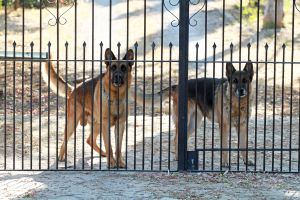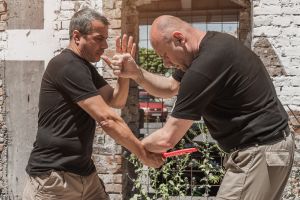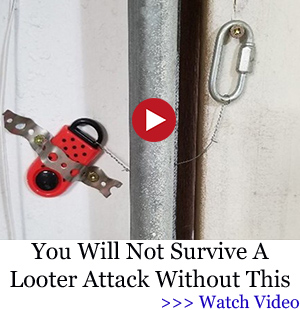![]()
It doesn’t matter how well prepared you are unless you can defend yourself and your possessions. That’s particularly true at home, where most preppers keep the bulk of their supplies and equipment. If you can’t defend your home in an emergency your chances of surviving fall dramatically.
Home defense is a particular problem for older preppers. With no disrespect to more senior readers, as you age it gets harder to protect yourself against intruders.
Your hearing isn’t as sharp, so you’re more likely to miss early warnings. Your balance isn’t quite as good anymore; you’re a little slower, and probably a little weaker.
You might also have problems like arthritis that make it harder for you to apply force. You still need to protect your home, though, so here are some suggestions on how to do that.
Get Alerted
The earlier you know intruders are sniffing round your home, the better your chances of successfully deterring or defeating them. An alarm system will let you know if someone tries to enter the building, but ideally you want more warning than that. Luckily there are a few options.
 A well-trained dog is a reliable way to get warned of intruders. If you live in a rural area geese will also make plenty noise if a stranger appears.
A well-trained dog is a reliable way to get warned of intruders. If you live in a rural area geese will also make plenty noise if a stranger appears.
Less organic solutions include tripwire-activated alarms, or even simple tin cans tied to fences.
Anything that makes a noise will give you more warning that someone is approaching, and there’s a good chance it will even scare them off.
You can also use technology to let you know of approaching problems. Modern security cameras like Ring are small, easy to install and affordable, and with night vision and motion sensors built in they can send alerts to your cell phone day and night.
Be a Hard Target
Make your home an unattractive target. A good perimeter fence or wall that needs some effort to get across will deter casual intruders.
Thieves don’t like to be visible, so if there’s nowhere to hide around your home they’re likely to think twice. Cut back bushes near entrances or under windows; the aim should be for the full exterior of your home to be visible.
⇒ If You Have This on Your Property, Throw It Away Immediately
Opportunist intruders can also be deterred by something as simple as keeping doors and windows secure.
A locked door is enough to stop someone just walking in; to get inside means either picking or forcing the lock, and that will put off a surprising number of criminals.
Be Ready to Fight
 So you can deter a lot of potential intruders before they even touch your front door, but unfortunately not all of them.
So you can deter a lot of potential intruders before they even touch your front door, but unfortunately not all of them.
Some will ignore fences, alarms, and force their way into your home anyway. At that point you have two choices – give up and let yourself become a victim, or be prepared to defend yourself.
It’s harder to defend yourself as a senior. You don’t have the strength or speed to grapple with intruders. On the other hand it’s far from hopeless. You do have options open to you.
First, stay as fit as you can. Just because you’re older, that doesn’t mean you can’t be active. Even a short walk every day will give you more confidence and mobility when it counts.
Get used to carrying a stick, as well. Even if you don’t need one to walk, a good solid walking stick can be helpful in all sorts of ways. Heavy hardwoods polish up nicely, and a decorative metal head looks attractive as well as giving a better grip.
Of course, if it comes to defending yourself, a heavy stick is a pretty useful thing to have – especially when it’s already in your hand…
Be Armed
A stick is a surprisingly effective weapon, and it has the advantage of giving you more reach – handled properly, a stick will usually beat a knife, for example. If you want to have the best chance of defending your home, though, you need a gun.
 Guns don’t take much strength to operate, and as long as you can shoot reasonably accurately they give you more reach than any stick ever will. As an older person you want to keep invaders as far away as possible, and you can’t beat a gun for that.
Guns don’t take much strength to operate, and as long as you can shoot reasonably accurately they give you more reach than any stick ever will. As an older person you want to keep invaders as far away as possible, and you can’t beat a gun for that.
Related: The Survival Guide To Concealed Carry
If you already have a gun, well done; if you practice with it regularly, even better. If you don’t already have a gun, you should seriously consider getting one.
When you’re choosing a gun it’s always important to find one that suits you. As an older person that means finding a weapon you can handle comfortably and effectively – and that you’re confident you’ll still be able to use in a few years.
We lose muscular strength as we age, and we slow down a bit too. This is already telling us something about the kind of gun we want; it should be light and controllable, for obvious reasons, and it should be semi-automatic. Why semi-automatic? Because if your first shot doesn’t stop the threat, you don’t want any delay as you manually chamber the next round.
I usually recommend a pump action 12-gauge shotgun as a home defense weapon, but for senior citizens I’m going to make an exception. A 12-gauge has heavy recoil, which some older people could struggle with, and a pump action needs to be worked rapidly and firmly to get the next shot off.
A shotgun is still a good choice – apart from anything else, that big yawning muzzle is more likely to make an intruder turn and run than just about anything else – but look at a compact 20-gauge semi-auto. At close range a 20-gauge will still put an assailant down, but the recoil is much lighter and so is the gun itself.
Something like a Benelli M3 with a 20-inch barrel and fixed stock is ideal – it’ll hold five rounds in the magazine and one in the chamber, giving you a lot of easily handled firepower. A 3” shell loaded with AA shot works well for home defense.
If you prefer a rifle, an AR15-style carbine with a 16” barrel is also a light, handy weapon that can be maneuvered indoors but has the range to protect your land too. It also takes capacious 30-round magazines, which should be more than enough for any home defense scenario.
Handguns are usually the hardest guns to use effectively, but if you have mobility problems they might be your only option. For example, if you need a stick or walker to get around you can’t really spare two hands for a long gun. Don’t worry – a handgun is still a lot better than nothing; you just need something that’s light and easy to use with one hand.
If it’s manageable I’d go with a 9mm Luger, which is a powerful round with relatively light recoil, but full-size 9mms can be heavy and the recoil becomes a lot sharper in a compact gun. Don’t be afraid to go with a smaller caliber; a .22 semi-automatic that you can consistently hit the target with, and that lets you take rapid follow-up shots, is better than a heavier gun with too much recoil.
Be Confident
Getting older does raise challenges when it comes to defending your home, but none of these are things you can’t deal with.
Even if you’re not as quick on your feet as you used to be, you can still use most of the usual techniques to deter or detect intruders before they even enter your home, and in the worst case the right gun – and the fact you’re on home ground that you know very well – will give you a fighting chance of coming out on top.
You may also like:
 23 Medicinal Plants the Native Americans Used on a Daily Basis
23 Medicinal Plants the Native Americans Used on a Daily Basis
Why You Should Never Hide Your Stockpile in Your Basement (Video)
The Calm Before the Storm: What’s Coming Next?
How To Build Self-Watering Raised Garden Beds
Great Depression vs Silent Depression

